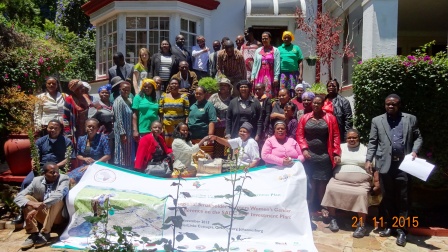SADC small scale women farmers want to turn poverty, hunger into history

21/11/2015
Johannesburg:
Need a game changer in the fight against poverty and hunger across Southern African Development Community?
Empowering SADC women is the answer.
Public and private stakeholders should lead the way by drawing and executing agri-investment policies and plans that address the need of small scale women farmers across the region.
According to representatives of small scale women farmers from SADC member countries, gender sensitive agri-investiment policies and plans would propel them to new heights and send mass poverty to dustbins of history.
This emerged last November at a Women’s Conference organized jointly by the Eastern and Southern Africa Small Scale Farmers Forum (ESAFF) and the Economic Justice Network (EJN) with support from Southern Africa Trust, Bread for the World and Oxfam Novib.
There was concession that women comprise majority active small scale farmers and if they are empowered, they can defeat the vicious cycle of poverty and hunger in a few years.
The conference was convened under the theme: “Influencing SADC RAP/IP with women SSF and gender lenses’’ and was attended by 45 participants with 32 women and 13 men from Southern Africa, the SADC Food, Agriculture and Natural Resources Department.
The countries represented at the conference include Tanzania, Zambia, Malawi, Zimbabwe, Lesotho, Swaziland, Botswana, Uganda and South Africa. The conference was a follow up to another conference convened by ESAFF titled a Women’s Small Holder Conference on the SADC Regional Agriculture Policy (RAP) on 12 December 2014.
Opening the conference, Mr. Serge Benstrong, the ESAFF Chairperson said that it is well known that 60-70% of the total population in the region lives in rural areas and women are mostly found in agriculture and depend on agriculture as a source of livelihood, for survival, income generation and employment creation. He said it was disheartening to see marginalisation of women in household, national and regional decision making structures. “This makes women disempowered when it comes to economic decisions,” he said.
Ms. Florah Maswanganyi, the ESAFF Vice Chairperson said that the SADC RAP IP outcomes should benefit women SSFs.
During the conference women farmers said that it is important that SADC make policies and programs in a more gender sensitive way to ensure that the implementation benefit both women and men.
Delegates also called for strengthened regulatory frameworks for agricultural development as well as agricultural research, development and innovation while considering how will enhance productivity of rural women small scale farmers.
They say there is a need for improved infrastructure for agricultural production and marketing targeting women small scale farmers. Support and conducive policy environment should put in place to enable women participate in the value chain and benefit from accessing market throughout the region. If Women can produce, definitely women can also benefit from the market.






















